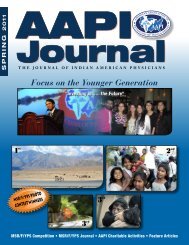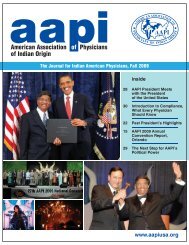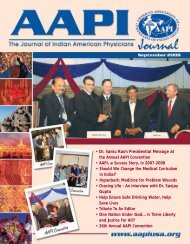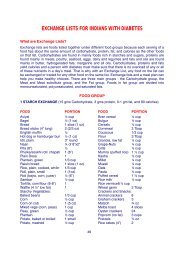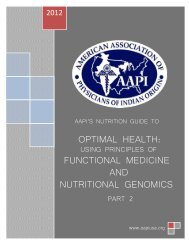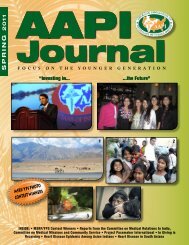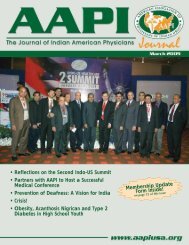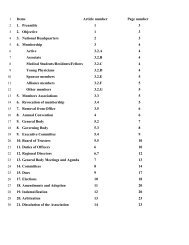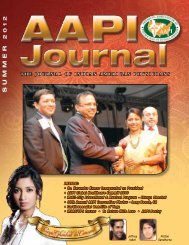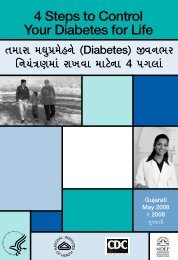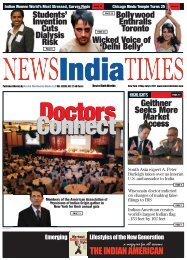functional medicine and nutritional genomics - American Association ...
functional medicine and nutritional genomics - American Association ...
functional medicine and nutritional genomics - American Association ...
You also want an ePaper? Increase the reach of your titles
YUMPU automatically turns print PDFs into web optimized ePapers that Google loves.
AAPI’S NUTRITION GUIDE TO OPTIMAL HEALTH: USING PRINCIPLES OF FUNCTIONAL MEDICINE AND NUTRITIONAL GENOMICS<br />
Raw ½ small ½–1 small 1 medium<br />
Canned 1/3 cup 1/3–½ cup ½ cup<br />
Juice 3–4 oz 4 oz 4 oz<br />
Grains<br />
Bread, buns, bagels ¼–½ slice 1 slice 1 slice<br />
Pasta, rice ¼–1/3 cup ½ cup ½ cup<br />
Cereal, cooked ¼–1/3 cup ½ cup ½–1 cup<br />
Cereal, dry 1/3–½ cup 1 cup 1 cup<br />
Crackers 2–3 4–6 4–6<br />
Meat <strong>and</strong> Dried Beans<br />
Meat, poultry, fish 1–2 oz 1–2 oz 2 oz<br />
Eggs 1 1 1–2<br />
Peanut butter 1 Tbsp 1–2 Tbsp 2 Tbsp<br />
Beans 2–4 Tbsp ¼–½ cup ½ cup<br />
Source: ADA Pocket Guide to Pediatric Nutrition Assessment<br />
Daily Multivitamin <strong>and</strong> Mineral Supplement for a<br />
Child with Autism - Children with autism tend to<br />
eat a very poor diet limited to only a few foods,<br />
so they often suffer from numerous vitamin <strong>and</strong><br />
mineral deficiencies. If this is the case, the child<br />
will need to take a daily multivitamin <strong>and</strong> mineral<br />
supplement. Many healthcare professionals believe<br />
that vitamin <strong>and</strong> mineral supplements are<br />
unnecessary <strong>and</strong> that children can get everything<br />
they need just by eating a well-balanced diet.<br />
This may be true for children who eat a variety of<br />
healthy foods from the different food groups, have<br />
a properly functioning digestive system that can<br />
digest <strong>and</strong> absorb the nutrients consumed, <strong>and</strong><br />
whose bodies are able to utilize the nutrients<br />
absorbed. Unfortunately, most children with autism<br />
do not fall into this category. Children with autism<br />
often eat a very limited variety of foods <strong>and</strong> have<br />
mealtime behavior problems that interfere with their<br />
food consumption (50, 51, 52). Many have<br />
sensory problems that impact their acceptance of<br />
certain textures, flavors, <strong>and</strong> smells of foods,<br />
resulting in feeding problems. Some autistic<br />
children are on elimination diets that limit their<br />
intake of certain nutritious foods. Still, others have<br />
chronic gastrointestinal disorders that interfere with<br />
their ability to digest <strong>and</strong> absorb nutrients properly.<br />
All of these factors make children with autism far<br />
more vulnerable to having chronic vitamin <strong>and</strong><br />
mineral deficiencies.<br />
Severe vitamin <strong>and</strong> mineral deficiencies are rare in<br />
the U.S.; however, marginal vitamin <strong>and</strong> mineral<br />
123<br />
deficiencies are very common. A marginal vitamin<br />
or mineral deficiency can result from a chronic<br />
poor diet, which impacts the child slowly, over<br />
time, with more subtle symptoms. Marginal vitamin<br />
<strong>and</strong> mineral deficiency symptoms include poor<br />
attention <strong>and</strong> concentration, irritability, loss of<br />
appetite, mood <strong>and</strong> behavior changes, depression,<br />
anxiety, <strong>and</strong> sleep disturbances. Marginal<br />
deficiencies can affect a child globally, meaning<br />
they can prevent both his body <strong>and</strong> brain from<br />
functioning at their best. The child will be<br />
physically <strong>and</strong> mentally unable to fully respond to,<br />
participate in, <strong>and</strong> benefit from his therapies. While<br />
vitamin <strong>and</strong> mineral supplements can not replicate<br />
all the nutrients a child would naturally consume<br />
from eating a variety of whole foods, a<br />
supplement is a good complement to his diet. A<br />
Registered Dietitian will advise parents on selecting<br />
an appropriate daily multivitamin <strong>and</strong> mineral<br />
supplement for the child.<br />
Water is the most basic nutrient our bodies need,<br />
<strong>and</strong> it is also one of the most neglected<br />
components of our diet. Our bodies need a certain<br />
amount of water each day for proper body<br />
temperature regulation, muscle function, absorption<br />
of nutrients, transporting nutrients into body cells,<br />
transporting waste out of body cells, <strong>and</strong> the<br />
elimination of waste <strong>and</strong> toxins from the body. We<br />
get water not only from drinking it, but also from<br />
other liquids like milk <strong>and</strong> juice <strong>and</strong> from<br />
vegetables <strong>and</strong> fruits. If we do not have enough<br />
water in our diet, we are at risk for dehydration.<br />
2012




